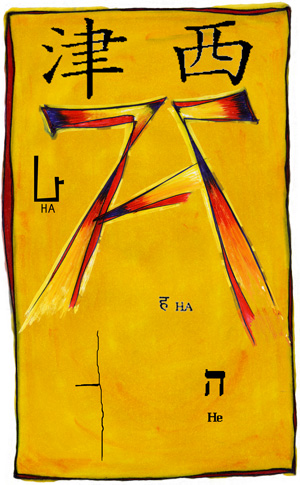
H
OED (paraphrased): The eighth letter of the Roman alphabet, representing the Semitic Hheth or Kheth, the Greek H, Heta, Eta; a laryngal or guttural spirant, or a rough aspirate. The aspirate value that the letter was originally used in Greek Roman use. When the Roman alphabet was applied to the Germanic languages, H was used initially for the simple aspirate or breath-sound, which had arisen out of a pre-Germanic or Aryan k, through the stages of guttural aspirate (kh), and guttural spirant (x); medially and finally h was put for the guttural spirant itself, which, in later times, came to be written gh or ch: thus, Gothic hauh, OHG. hôh, OE. héah, mod. English high (gh mute), Scotch heich, Ger. hoch. In Old English, h occurred not only before the vowels, but also before the consonants l, n, r, w (representing the pre-Germanic kl-, kn-, kr-, kw-, or q-), as in hláf loaf, hnecca neck, hræfn raven, hwá who; it now stands initially only before vowels. Its power is that of a simple aspiration or breathing, with just sufficient narrowing of the glottis to be audible before a vowel. It is also used to form consonantal digraphs (sh, th, etc.) with simple sounds; and it is often silent, or merely lengthens a preceding vowel. The name aitch, which is now so remote from any connexion with the sound, goes back through ME. ache to OF. ache = Sp. ache, It. acca, pointing to a late L. *accha, *ahha, or *aha, exemplifying the sound; cf. It. effe, elle, emme, etc. (The earlier L. name was ha.)
